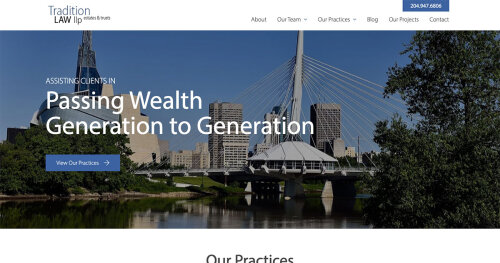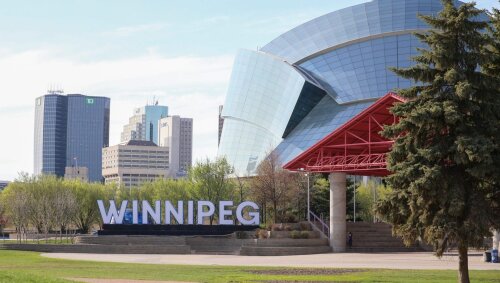Best Public-Private Partnerships (PPP) Lawyers in Winnipeg
Share your needs with us, get contacted by law firms.
Free. Takes 2 min.
List of the best lawyers in Winnipeg, Canada
About Public-Private Partnerships (PPP) Law in Winnipeg, Canada
Public-Private Partnerships, often called PPPs or P3s, are collaborative agreements between public sector entities such as government departments or municipalities and private sector companies. In Winnipeg, as across Canada, PPPs are commonly used to finance, construct, and operate public infrastructure projects like roads, bridges, schools, hospitals, and water treatment facilities. PPP arrangements are designed to leverage the expertise and resources of the private sector while serving the public interest and ensuring project accountability. The legal framework governing PPPs in Winnipeg is shaped by both Manitoba provincial laws and federal initiatives, as well as the specific terms negotiated for each project.
Why You May Need a Lawyer
Entering into or managing a PPP involves complex contractual relationships and often significant financial stakes. Here are some common situations where legal representation is important:
- You are a private company considering a bid on a public infrastructure project in Winnipeg.
- You are a public sector body or municipal office seeking to launch or oversee a PPP.
- You need assistance reviewing, negotiating, or drafting PPP contracts.
- You are facing disputes regarding performance, payment, or changes during a PPP project.
- There are questions around regulatory compliance, environmental impacts, or procurement rules.
- Risk management, insurance, and financing for the PPP project need legal scrutiny.
- You want advice about long-term obligations and asset management in PPPs.
Given the scale and complexity of PPPs, early legal advice can reduce risk, uncover potential issues, and ensure your rights are protected throughout the life cycle of the partnership.
Local Laws Overview
In Winnipeg, PPPs are primarily governed by a combination of federal, provincial (Manitoba), and local municipal laws. Key legal aspects include:
- Procurement Rules: City of Winnipeg and Province of Manitoba regulations outline how public contracts are tendered, awarded, and monitored. These aim to ensure fairness, transparency, and value for money in PPP arrangements.
- Municipal Government Act (Manitoba): Sets out the powers, duties, and responsibilities of municipalities, including authority to enter PPPs.
- Public Sector Accountability: Legislation ensures public interest protection, including reporting, performance benchmarks, and audit requirements for PPPs.
- Contract Law: PPP agreements must comply with Canadian contract standards, addressing risk allocation, default, dispute resolution, and termination.
- Environmental and Land Use Laws: Projects must comply with environmental assessments, permits, and zoning requirements at all levels of government.
- Labour and Employment Regulations: Any construction or operation carried out under a PPP must meet Manitoba labour laws and fair wage standards.
Specific PPP projects may also be subject to additional local bylaws, Indigenous consultation obligations, and project-specific regulations.
Frequently Asked Questions
What is a Public-Private Partnership (PPP) in Winnipeg?
A PPP in Winnipeg is a cooperation between a public sector entity and a private sector business to develop, finance, and operate infrastructure or deliver services traditionally provided by the public sector.
Who can participate in a PPP?
Typically, government agencies, municipalities, and Indigenous governments partner with private companies, consortia, or investors who have the experience and financial capacity to deliver large projects.
How are PPP projects selected and approved in Winnipeg?
Projects are chosen based on public need, potential value for money, and policy priorities. Approval often involves a competitive tendering process, feasibility studies, and public consultations before any official agreements are signed.
What are the main advantages of PPPs?
PPPs can provide faster project delivery, access to private sector innovation and financing, enhanced risk sharing, and better life cycle maintenance of public assets.
What kind of legal agreements are involved?
PPPs require comprehensive legal agreements covering construction, financing, operation, risk allocation, performance standards, revenue sharing, insurance, and more.
What risks are involved in PPPs?
Risks can include delays, cost overruns, disputes between partners, regulatory compliance, changing government policies, and financial uncertainties.
Are PPPs always used for large projects?
While PPPs are common for major infrastructure undertakings, they can also be suitable for smaller or specialized projects depending on the needs and objectives of the parties.
How are disputes resolved in PPP arrangements?
Dispute resolution mechanisms, including mediation, arbitration, and litigation, are built into PPP contracts to handle disagreements without unnecessary delays or costs.
Do PPPs affect public oversight and accountability?
Public accountability remains a legal requirement. Regular disclosures, audits, and performance reviews are mandated by local and provincial laws.
How can I find out about upcoming PPP opportunities in Winnipeg?
Both the City of Winnipeg and Manitoba Infrastructure issue public notices and requests for proposals for PPPs, which are often posted on their official websites and in trade publications.
Additional Resources
If you need further information or assistance regarding PPPs in Winnipeg, the following resources may be helpful:
- City of Winnipeg - Infrastructure Planning Department
- Manitoba Infrastructure (Provincial Authority)
- Manitoba Finance - Procurement Services
- PPP Canada (federal guidance and best practices)
- Winnipeg Chamber of Commerce - Business Advisory Services
- Local law firms with expertise in construction, municipal, and administrative law
You can also consult professional associations such as the Canadian Council for Public-Private Partnerships for guidance and resources.
Next Steps
If you require legal assistance with a PPP in Winnipeg, consider the following steps:
- Gather all documentation and correspondence related to your PPP project or opportunity.
- Identify the specific legal issues or questions you need to address, such as contract review, regulatory compliance, or dispute resolution.
- Contact a local lawyer or law firm with experience in PPPs, construction law, municipal regulation, and contract negotiation.
- Schedule a consultation to discuss your situation and potential legal strategies.
- Stay informed about local and provincial PPP policies, announcements, and legal requirements.
Early legal input can help you navigate the complex landscape of PPPs and secure the best possible outcome for your project or organization. If you have further questions, do not hesitate to seek professional legal advice specific to your circumstances.
Lawzana helps you find the best lawyers and law firms in Winnipeg through a curated and pre-screened list of qualified legal professionals. Our platform offers rankings and detailed profiles of attorneys and law firms, allowing you to compare based on practice areas, including Public-Private Partnerships (PPP), experience, and client feedback.
Each profile includes a description of the firm's areas of practice, client reviews, team members and partners, year of establishment, spoken languages, office locations, contact information, social media presence, and any published articles or resources. Most firms on our platform speak English and are experienced in both local and international legal matters.
Get a quote from top-rated law firms in Winnipeg, Canada — quickly, securely, and without unnecessary hassle.
Disclaimer:
The information provided on this page is for general informational purposes only and does not constitute legal advice. While we strive to ensure the accuracy and relevance of the content, legal information may change over time, and interpretations of the law can vary. You should always consult with a qualified legal professional for advice specific to your situation.
We disclaim all liability for actions taken or not taken based on the content of this page. If you believe any information is incorrect or outdated, please contact us, and we will review and update it where appropriate.











